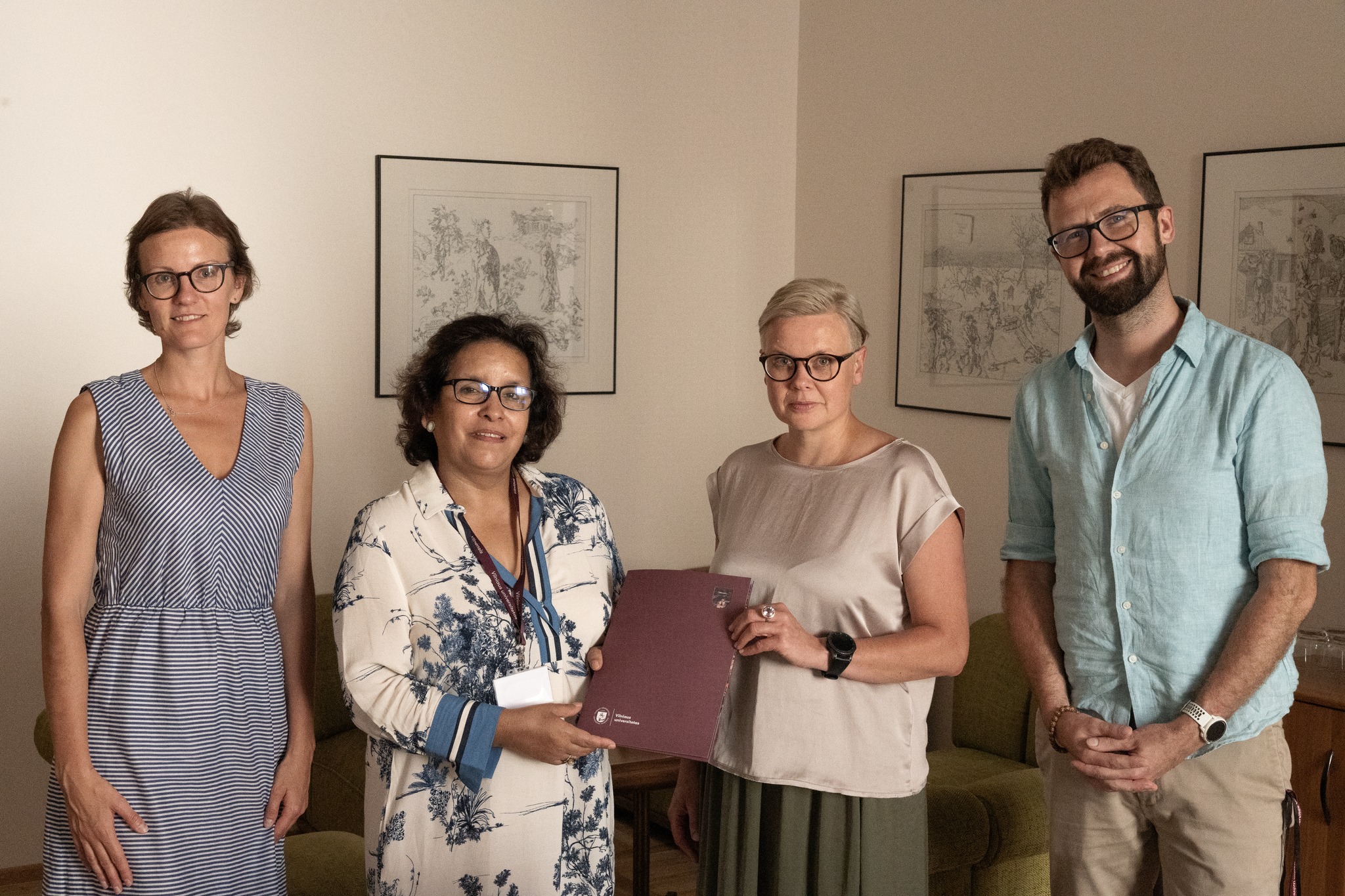Dr. Sarah Ahmed’s Support for the Development of Indian and South Asian Studies and Research at Vilnius University

On 16 August 2023, Indian researcher Dr. Sara Ahmed, together with Prof. Vilmantė Pakalniškienė, Pro-Rector of Vilnius University (VU), Assoc. Prof. Vytis Silius, Vice-Dean of the Faculty of Philosophy, and Assoc. Prof. Kristina Garalytė, Director of the Institute of Asian and Transcultural Studies at VU, signed a financial support agreement.
To commemorate her grandmother Liubov Derczanska Hamied, a Litvak born in Vilnius, Dr Ahmed devoted another €10,000 in the form of support for students and researchers of Indian and South Asian studies at VU. The first financial support agreement was signed in 2017. As a result, VU students of the Indian and South Asian Studies programme visited countries in the South Asian region where they conducted research and took part in academic expeditions. The renewed support agreement and the extended scope of support will help Lithuania to become further acquainted with India and other South Asian countries. Both students and researchers of VU will be eligible for the support.
Dr. S. Ahmed shared her impressions: “I am pleased to be able to visit VU again to renew and extend the scope of the support agreement I initiated in 2017 – the financial support in honour of Liubov Derczanski Hamied is provided to VU students and researchers who intend to conduct their research in India or in other South Asia locations. I hope that this support will help young people to transcend cultural and institutional boundaries, strengthening mutual understanding and relations between our peoples that date back almost 400 years. My grandmother, who came to India at the end of the 1920s, was an “stranger” to this new culture, but she quickly started referring to it as her home. My grandmother spoke several languages: Polish, Russian, Yiddish, and German. Later in life, when she lived in Mumbai, she also learned English and Hindustani, which came in handy when negotiating in bustling local markets while wearing European outfits. My grandmother taught me that humanness is a universal value and that we all share the same planet. Despite the horrors of the Holocaust, which resulted in the extermination of many members of her family, my grandmother was a stoic woman who never complained but rather showed us what compassion, tolerance, and empathy actually are.”
The visit of Dr. S. Ahmed and the signing of the agreement took place at the time of the International Summer School of South Asian Studies held on 14–20 August 2023 by the Institute of Asian and Transcultural Studies at VU for the third time. Under the name “South Asia on the Move”, it discussed contemporary cultural, social, and political developments in India and the South Asian region from the perspective of various research fields. This year's summer school was attended by researchers and students from universities in Belgium, Denmark, Germany, India, Lithuania, Norway, Poland, Sweden, Turkey, and Ukraine.
Two lectures were given by Dr. S. Ahmed at the summer event. The first analysed the changing gender roles in modern India. The researcher shared her experience in teaching a gender studies course in Indian higher educational establishments, including her insights into the current situation of women in India. Dr. S. Ahmed said that although she has noticed that the media in India is increasingly publicising and condemning violence against women, this does not lead to any sustainable changes. Still, in modern India, informal practices are emerging and creative ways are being sought to overturn traditional power structures. According to Dr. S. Ahmed, even passive attendance at meetings on issues of gender inequality contributes to improving the situation, as “women's silence also has a say”.
In her other lecture, the researcher presented the Living Waters Museum, where she acts as a curator. Founded by the researcher in 2017, the virtual museum aims to document and preserve the aquatic heritage in India, thus encouraging modern-day youth to build a sustainable relationship with water. The idea of a virtual museum was born when Dr Ahmed realised that in the modern world, traditional ways of telling stories have changed. Compared to a physical environment, the virtual space is a more dynamic platform for visualising stories about water heritage, which “can flow like water and take on various forms.”
The Institute of Asian and Transcultural Studies at VU extends their heartfelt gratitude to Dr. Sarah Ahmed for her generosity and hopes that students and researchers will make active use of the support to strengthen mutual relations between Lithuania and India.